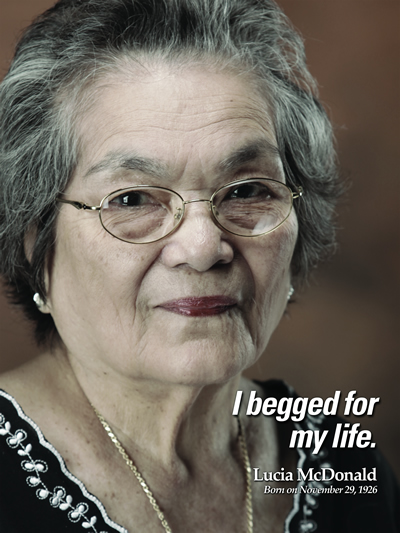 My name is Lucia McDonald. My family lives Toggai, Agana. My father was a Hispanic-American Navy man who married a local Chamorro woman when he was stationed on Guam. He had relocated to California years before the war and he was waiting for his family to join when the Japanese invaded Guam. I was 14 years old when the Japanese bombed Sumay. My mother told us to pack whatever we could hold with our two arms and walked to our relative, Ranson Jr. We never returned home because Agana was off limits. During the liberation of Guam, the Americans bombed and bulldoze our home, so we could never come back.
My name is Lucia McDonald. My family lives Toggai, Agana. My father was a Hispanic-American Navy man who married a local Chamorro woman when he was stationed on Guam. He had relocated to California years before the war and he was waiting for his family to join when the Japanese invaded Guam. I was 14 years old when the Japanese bombed Sumay. My mother told us to pack whatever we could hold with our two arms and walked to our relative, Ranson Jr. We never returned home because Agana was off limits. During the liberation of Guam, the Americans bombed and bulldoze our home, so we could never come back.
Once the Japanese soldiers found out through the interpreter that our father was an American Navy man, they tortured us on a daily basis. We would get punched, kicked and poked by bayonets and a head choke. On one occasion, my three brothers were in prison and beaten badly. One brother was beaten so badly on his leg that when they release him months later, he could not walk anymore. We were forced to work in the fields and clear jungle areas in Ta'i, Sinajana and Tiyan Air Field, from morning to night. After our work in the field, we were forced to go to Japanese school at night. Throughout the day we had to find our own food as we work. Sometimes, we ate only one coconut among many of us. We had to hide our food so we wouldn't get beaten. On one of our work days, we were forced to circle around and witness the execution of three men. One was beheaded and the others shot. We were told not to cry or yell or else we also would be killed.
That was the end, Monday. I was afraid to report to the fields because of the plane dogfights that morning. The next day, along with three other girls, we were escorted and questioned about our accidents at the field that day. I was slapped repeatedly and a sword was placed on my shoulder. The interpreter told me that I was going to be killed if I lied about my absence. I begged for my life. Later, he asked if I wanted to be drowned in the big drum of a container of water. Two girls were told to clean the wounds of the Japanese soldiers. One girl was taken into the sleeping quarters of the Japanese official and I was told to grind coconut for the soldiers.
Three of us were released that night. One girl, who was taken into the sleeping quarters was kept there for a couple of days before they returned her home. But, then her father hung himself because he could not bear to see his daughter suffering and what she went through.
We were forced to march to Manenggon. We could not stop along the way. There were old people who collapsed along the way. At the camp, we could not cook or else we would be beaten or killed. The Japanese did not want us to let the Americans know where we were if fires were lit. We were forced to take our water from the dirty river. The river was dirty because of the dead bodies that were rotting along the riverbanks. We all got sick from the water. Many children and old people died from diarrhea.
My husband, Charles McDonald, also had a father in the Marines and a Chamorro mother, who we hide in the jungle because of his white skin and green eyes. He would have been killed if they found him. He would only come to get water at night. But, he would have to cover his skin with mud. He was wounded by Japanese sniper. He was the first Chamorro to greet the Marines and guide them around the island. He was deputized as an insular patrolman, given M-1 carbine and told to capture Japanese soldiers.
I want to thank you today for giving us the opportunity to tell you our story. It is too late for my husband since he died seven years ago. If he was here, he could tell you more sufferings. But, he would also tell you how proud he is to be an American.
Real People. Real Stories. A weekly testimonial series provided by the Office of Senator Frank F. Blas, Jr. The testimony of Lucia McDonald is recorded in the Guam War Claims Review Commission public hearings held in Hagåtña, Guam on December 9, 2003. This story sponsored by the community involvement of Younex Enterprises Corporation. Photo courtesy of Expressions Studio.
 |
 |
